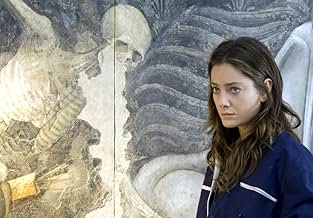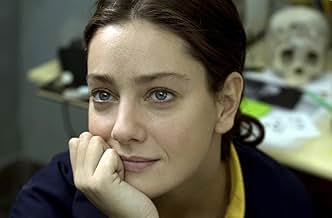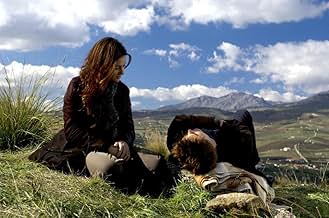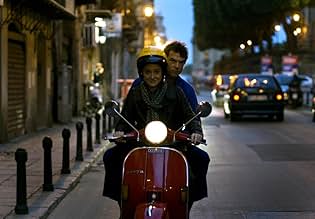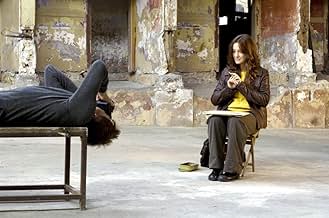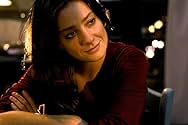Palermo Shooting
- 2008
- 2 h 4 min
AVALIAÇÃO DA IMDb
6,1/10
3,3 mil
SUA AVALIAÇÃO
O estilo de vida selvagem, de um famoso jovem fotógrafo alemão, quase o mata. Ele decide, então, ir para Palermo, na Sicília, para fazer uma pausa. A bela cidade e uma atraente mulher do loc... Ler tudoO estilo de vida selvagem, de um famoso jovem fotógrafo alemão, quase o mata. Ele decide, então, ir para Palermo, na Sicília, para fazer uma pausa. A bela cidade e uma atraente mulher do local poderão ajudá-lo a se acalmar?O estilo de vida selvagem, de um famoso jovem fotógrafo alemão, quase o mata. Ele decide, então, ir para Palermo, na Sicília, para fazer uma pausa. A bela cidade e uma atraente mulher do local poderão ajudá-lo a se acalmar?
- Direção
- Roteiristas
- Artistas
- Prêmios
- 1 vitória e 2 indicações no total
- Direção
- Roteiristas
- Elenco e equipe completos
- Produção, bilheteria e muito mais no IMDbPro
Avaliações em destaque
Wenders' supreme quality as an author, to my view, is that he knows that his films are not so much about what images show, but about images themselves. This is his magic, and his curse. This is why i have a shelter in his films, and why so many increasingly misunderstand them (first reviews on this one show it will go to the same package). Wenders knows this, whenever he is making a film, he is reflecting on the nature of image, and how that affects vision, and how vision affects understanding, and how understanding affects meaning, and essence.
Not few times, he addresses directly the theme, and embeds it in the plot of the film. This is such a case. Film about images. People who are about image. People who become the images they fetch. The very first scene makes it clear. It "frames" (how meaningful this word is with Wenders) a landscape, through a window of a building which is in itself all about framing. A pure volume full of square holes, all of them corresponding to a different frame, depending on moment you look, position, distance to the window. This building reflects the personality of the photographer, it is in itself a succession of frames, a closed capsule interlaced with partial views to the outside.
Than we have a story about creating images. A character photographer who loses his soul because he becomes a faker, he forgets the essence, he no longer searches for a truth in the image, instead he creates his own fake truth. Fake Australian skies reflected on S.Paulo's windows, that kind of stuff. The introduction of Milla stands for this, as she is photographed 'artificially', and than transported to the "true" environment. Than the photographer retires, isolated, to a place he feels to be 'true' (a big port, Palermo means).
Now the big things happen in Palermo.
The woman. Her work is to recover images, it is to find the "truth" of images, it is to interpret the vision of somebody else. Those eyes of the painter, starring at the "camera", what he was seeing is what she wants to see. Check the oppositions, check how that fresco is worked on the film: detail versus global sight, understanding versus loosing the essence, long versus short. Check how the time of an image is understood. The woman takes years working on one image, the photographer produces thousands without understanding a single one.
The Death. It's not the death, it's Dennis Hopper, and this matters. To see how Hopper was inserted in this project made the whole thing come clear to me, and it completed a portion of my film life that i now know was incomplete. Hopper is here the designated master framer, the man who observes life, who pulls strings (even though he is only doing his job). He is a superior agent, someone who is beyond and above all that we see. When people look at him, he looks back. He makes the record of all that, we see that, that metaphor of arrows, of "shooting" with a double meaning. So he is framed as much as he is a framer. Now, remember The American Friend. See that film before seeing this one if you can, it may strike you as 2 halves of the same idea, as it stroke me. Check how similar are the characters Hopper performs. There he was also the master framer, the manipulator behind the actions that we had. In fact he was manipulating a "framer" (literaly, a man who created frames for paintings). He used the framer as he provided the main "image". That film, which i consider essential, was all about the same game of images. Now we have an update, on how times changed (and with it changed deeply our relation to images) and how Wenders himself changed. Dennis Hopper is the connection, and his role is pivotal.
Now, i believe that if you want to establish a successful relation to a creator you have to take his works for what they are. It's like loving beyond infatuation, like friendship beyond day to day chat. You have to enjoy the qualities and most important, acknowledge the flaws, and you have to live with that. That's my kind of relation with Wenders. His films in the last 10 years or so have become more and more on the verge of being an intellectual monologue, something you are supposed to sit and listen, and nod affirmatively with you head. That's something i won't tolerate with other filmmakers (Stone, Tarantino), but that i'm willing to put up with Wenders, because it matters to me what he has to say. If, like i did, you are able to put up with discursive dialogs, and the sensation that the man beyond the scenes is leading you to believe that he has the Truth, you may let this change your life. I did.
A side quality you might appreciate is how music shapes the environment, regardless of the scenery. Wenders was also great in understanding this, now he does it with the aid of portable music. The music editing is great
My opinion: 5/5
http://www.7eyes.wordpress.com
Not few times, he addresses directly the theme, and embeds it in the plot of the film. This is such a case. Film about images. People who are about image. People who become the images they fetch. The very first scene makes it clear. It "frames" (how meaningful this word is with Wenders) a landscape, through a window of a building which is in itself all about framing. A pure volume full of square holes, all of them corresponding to a different frame, depending on moment you look, position, distance to the window. This building reflects the personality of the photographer, it is in itself a succession of frames, a closed capsule interlaced with partial views to the outside.
Than we have a story about creating images. A character photographer who loses his soul because he becomes a faker, he forgets the essence, he no longer searches for a truth in the image, instead he creates his own fake truth. Fake Australian skies reflected on S.Paulo's windows, that kind of stuff. The introduction of Milla stands for this, as she is photographed 'artificially', and than transported to the "true" environment. Than the photographer retires, isolated, to a place he feels to be 'true' (a big port, Palermo means).
Now the big things happen in Palermo.
The woman. Her work is to recover images, it is to find the "truth" of images, it is to interpret the vision of somebody else. Those eyes of the painter, starring at the "camera", what he was seeing is what she wants to see. Check the oppositions, check how that fresco is worked on the film: detail versus global sight, understanding versus loosing the essence, long versus short. Check how the time of an image is understood. The woman takes years working on one image, the photographer produces thousands without understanding a single one.
The Death. It's not the death, it's Dennis Hopper, and this matters. To see how Hopper was inserted in this project made the whole thing come clear to me, and it completed a portion of my film life that i now know was incomplete. Hopper is here the designated master framer, the man who observes life, who pulls strings (even though he is only doing his job). He is a superior agent, someone who is beyond and above all that we see. When people look at him, he looks back. He makes the record of all that, we see that, that metaphor of arrows, of "shooting" with a double meaning. So he is framed as much as he is a framer. Now, remember The American Friend. See that film before seeing this one if you can, it may strike you as 2 halves of the same idea, as it stroke me. Check how similar are the characters Hopper performs. There he was also the master framer, the manipulator behind the actions that we had. In fact he was manipulating a "framer" (literaly, a man who created frames for paintings). He used the framer as he provided the main "image". That film, which i consider essential, was all about the same game of images. Now we have an update, on how times changed (and with it changed deeply our relation to images) and how Wenders himself changed. Dennis Hopper is the connection, and his role is pivotal.
Now, i believe that if you want to establish a successful relation to a creator you have to take his works for what they are. It's like loving beyond infatuation, like friendship beyond day to day chat. You have to enjoy the qualities and most important, acknowledge the flaws, and you have to live with that. That's my kind of relation with Wenders. His films in the last 10 years or so have become more and more on the verge of being an intellectual monologue, something you are supposed to sit and listen, and nod affirmatively with you head. That's something i won't tolerate with other filmmakers (Stone, Tarantino), but that i'm willing to put up with Wenders, because it matters to me what he has to say. If, like i did, you are able to put up with discursive dialogs, and the sensation that the man beyond the scenes is leading you to believe that he has the Truth, you may let this change your life. I did.
A side quality you might appreciate is how music shapes the environment, regardless of the scenery. Wenders was also great in understanding this, now he does it with the aid of portable music. The music editing is great
My opinion: 5/5
http://www.7eyes.wordpress.com
This is easily Wim Wender's most pretentious movie to date, and that's saying a lot given that Wenders is perhaps the most pretentious director of his generation. There is so much symbolic Mumbo-Jumbo I don't know where to begin: Dungeons. Coffins. Dead people. Ghosts. Including Lou Reed as a black-and-white specter of himself. Flocks of sheep. A shape-shifting city skyline. Hooded strangers, shooting arrows and causing crashes. All of which I have seen before, and with more panache: In "Dark City", in Cronenberg's "Crash", Paul Auster's "Lulu on the Bridge", Tom Tykwer's "Winter Sleepers", even in TV's "Lost". I'm not even mentioning "The Devil's Advocate". At the height of his self-importance, Wenders has Dennis Hopper, in the part of Death himself, make a speech about the merits of analog photography. Sounds ridiculous? Go figure. But the weakest link is Wender's choice of Campino as photographer Finn Gilbert, the lead character. Campino, a German rock star in his day job, may be photogenic in an aging toy boy way, but an actor he sure is not. Anything he says sounds like a line from a script, and the script is weak enough to begin with. Wenders asks too much of him, and too little of his co-lead Giovanna Mezzogiornio, a fine actress restricted to sleepy smiles and sullen glances in this movie. Charming guest appearances by Jana Pallaske as a feisty arts student, Inga Busch as a sexy swimming instructor in Ugg boots and a bathing suit, and by the divine Milla Jovovich as her glamorous self. Nice enough soundtrack, featuring Bonnie Prince Billy, Nick Cave, and The Velvet Underground. Watch with your eyes closed.
image - still and moving - digital - film - panorama - window - painting. how is the world described in photographic/image capture? who sees? framing. who is seeing? what is seen? what is shown? dreams. i am a camera. this is maybe an over extension of the metaphor, but clearly states the idea of the seer seeing. audience. and the seer showing. story through experience, not always linear or real. and always - great views of the city. great mix of language & languages. vision. so much feeling, showing and not telling. faces, moments, real, unreal... "I watch it for a little while = I love to watch things on TV" this was interesting to see in las vegas, of all the places in the world.
Finn (Campino) is a German photographer. He is highly successful in his profession, but not in life. He can't quite put his finger on it, yet there's something missing and he is overwhelmed by dark thoughts. He decides to spend some time in Italy as an attempt to escape.
Palermo Shooting is a movie heavy on symbolism and with a clear philosophical orientation, a meditation about life and death. However, its good looks are its strongest asset. The setting is once again in the spotlight for Wim Wenders, first beautiful Palermo and then the gorgeous landscapes of a small Italian village.
The main character's interactions with Death are reminiscent of Bergman's The Seventh Seal, while his subjective way of experiencing reality and the use of special effects has a clear touch of German expressionism.
It's easy to tell this was a very personal project for Wim Wenders, but still not everything works. The philosophical aspect isn't that interesting or original, the dialogue leaves a lot to be desired, the soundtrack felt a bit off.
Palermo Shooting is a movie heavy on symbolism and with a clear philosophical orientation, a meditation about life and death. However, its good looks are its strongest asset. The setting is once again in the spotlight for Wim Wenders, first beautiful Palermo and then the gorgeous landscapes of a small Italian village.
The main character's interactions with Death are reminiscent of Bergman's The Seventh Seal, while his subjective way of experiencing reality and the use of special effects has a clear touch of German expressionism.
It's easy to tell this was a very personal project for Wim Wenders, but still not everything works. The philosophical aspect isn't that interesting or original, the dialogue leaves a lot to be desired, the soundtrack felt a bit off.
Just to make sure to do justice, and that I had not misses something, I watched Palermo shooting twice before sharing how disappointing this mess of a film is.
Wenders has been going downhill, and severely for a couple of decades. Stick to his works of genius from the 1970's and 80's. Another reviewers said Wenders is "increasingly misunderstood."
That is the the problem. the problem is Wenders is increasing in a repetitive and hermetic bubble of his own making. See his most recent nonsense and ridiculously hagiographic portrait of Pope Francis to see the full decline.
Wenders has been going downhill, and severely for a couple of decades. Stick to his works of genius from the 1970's and 80's. Another reviewers said Wenders is "increasingly misunderstood."
That is the the problem. the problem is Wenders is increasing in a repetitive and hermetic bubble of his own making. See his most recent nonsense and ridiculously hagiographic portrait of Pope Francis to see the full decline.
Você sabia?
- CuriosidadesThe film marks the first time that Director Wenders shot a movie in his hometown, Düsseldorf.
- Erros de gravaçãoIn the scene, when Finn talks with lady photographer, they discuss the age of their cameras. He tells that his Plaubel is twenty years old and she tells that her Leica is 40 years old. Actually she has Leica M7, which slightly differs from older Leica cameras. This camera marketed only in 2002.
- ConexõesFeatured in Dennis Hopper: Uneasy Rider (2016)
- Trilhas sonorasDream (Song for Finn)
Written by Nick Cave and Warren Ellis
Performed by Grinderman
Published by Mute Song Ltd. 2008
Courtesy of Cave/Ellis 2008
Principais escolhas
Faça login para avaliar e ver a lista de recomendações personalizadas
- How long is Palermo Shooting?Fornecido pela Alexa
Detalhes
- Data de lançamento
- Países de origem
- Centrais de atendimento oficiais
- Idiomas
- Também conhecido como
- Palermo'da yüzleşme
- Locações de filme
- Empresas de produção
- Consulte mais créditos da empresa na IMDbPro
Bilheteria
- Faturamento bruto mundial
- US$ 580.203
- Tempo de duração
- 2 h 4 min(124 min)
- Cor
- Mixagem de som
- Proporção
- 1.85 : 1
Contribua para esta página
Sugerir uma alteração ou adicionar conteúdo ausente


